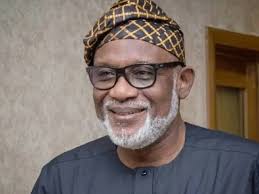By: Abubakar Yunusa and Daniel Otera
Rotimi Akeredolu, Governor of Ondo State, has died at the age of 67 after a prolonged battle with leukaemia and prostrate cancer, his family announced on Wednesday. Akeredolu, who was elected for a second term in 2020 under the platform of the All Progressives Congress (APC), passed away at a hospital in Lagos, where he had been receiving treatment for several months. His deputy, Lucky Aiyedatiwa, who was sworn in as the acting governor, has declared a seven-day mourning period and ordered that flags be flown at half-mast across the state. He also described Akeredolu as a visionary leader, a mentor, and a father figure, who devoted his life to the service of his people and the nation.
“His death is a great loss not only to Ondo State, but to Nigeria as a whole. He was a man of integrity, courage, and excellence, who championed the cause of the development, peace, and security of our state and the Southwest region,” Aiyedatiwa said in a statement.
Akeredolu, who was born on July 21, 1956, in Owo, Ondo State, was a lawyer and a Senior Advocate of Nigeria (SAN), who served as the president of the Nigerian Bar Association from 2008 to 2010. He also played a prominent role in the formation of the Southwest Governors’ Forum, a platform for the collaboration and integration of the six states in the region. Akeredolu is survived by his wife, Betty, and four children. Akeredolu’s death has brought to the fore the prevalence of leukaemia, a type of blood cancer. According to the World Health Organization (WHO), leukaemia is the 11th most common cancer in Nigeria, with an estimated 5,000 new cases and 4,000 deaths per year.
Leukaemia affects the production and function of white blood cells, which are responsible for fighting infections and diseases. The symptoms of leukaemia include fever, fatigue, bleeding, bruising, infections, weight loss, and bone pain. The causes of leukaemia are not fully understood, but some risk factors include exposure to radiation, chemicals, viruses, genetic disorders, and family history. The treatment of leukaemia depends on the type, stage, and severity of the disease, and may include chemotherapy, radiotherapy, stem cell transplant, and targeted therapy.
However, the availability and affordability of these treatments are limited in Nigeria, due to the poor state of the health sector, the lack of adequate facilities and equipment, and the high cost of drugs and services. Before Akeredolu, one other Nigerian governor died of leukaemia while serving his state. The first was Mamman Bello, who was the governor of Yobe State from 2007 to 2009. He died on January 27, 2009, at the age of 56, at the King Faisal Specialist Hospital in Saudi Arabia, where he had gone for medical check-up. Bello, who was a member of the All Nigeria Peoples Party (ANPP), was elected as the governor of Yobe State in 2007, after serving as a senator for eight years. He was also the chairman of the Senate Committee on Public Accounts.
He was succeeded by his deputy, Ibrahim Gaidam, who completed his tenure and won a second term in 2011. Patrick Yakowa, who was the governor of Kaduna State from 2010 to 2012. He died on December 15, 2012, at the age of 64, in a helicopter crash that occurred while he was travelling from Bayelsa to Port Harcourt.
Yakowa, who was a member of the People’s Democratic Party (PDP), became the governor of Kaduna State in 2010, after his predecessor, Namadi Sambo, was appointed as the vice president of Nigeria by former President Goodluck Jonathan. He was the first Christian governor of Kaduna State, a state that had witnessed several episodes of religious and ethnic violence. He was known for his peace-building initiatives, his infrastructural development projects, and his welfare programmes for the people of his state. He was succeeded by his deputy, Mukhtar Yero, who completed his tenure and lost the 2015 election to Nasir El-Rufai of the APC.
Spokesman to President Bola Tinubu has confirmed the death of Ondo State governor Rotimi Akeredolu. Presidential spokesman Bayo Onanuga in a tweet said Akeredolu “finally lost the battle with ravaging illness. Akeredolu’s health had been a source of public concern for some time. He returned to Nigeria in September after a three-month medical leave in Germany, but only recently handed over power to his deputy, Lucky Aiyedatiwa, following the intervention of President Bola Tinubu.
Section 191(1) of the 1999 constitution, as amended, states, “The Deputy Governor of a State shall hold the office of Governor of the State if the office of Governor becomes vacant by reason of death, resignation, impeachment, permanent incapacity, or removal of the governor from office for any other reason in accordance with sections 188 or 189 of this constitution.” Akeredolu, a lawyer and member of the All Progressives Congress (APC), was elected Governor of Ondo State in 2016 and re-elected for a second term in 2020. He was known for his outspokenness and advocacy for restructuring, as well as his fight against illegal mining and open grazing in the state and southern Nigeria. In the heady days of the crisis caused by the ill-health of late President Umaru Musa Yar’Adua, Akeredolu was one of the vocal voices who called on Yar’Adua to step down in order to attend to his health.























